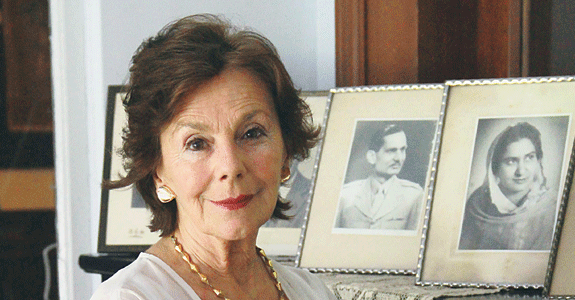Lunch with Royalty: Reflections on Lunch forum with Princess Kenize Mourad
On Saturday, November 15th, GU Muslim Life welcomed Princess Kenize Mourad, the granddaughter of the last Ottoman ruler Mourad V and the daughter of an Indian rajah, to Georgetown in a lunch forum discussing the future of the Middle East. Previously an investigative journalist, Mourad’s perspective on the current crises in the region brought intimate attention to various conflicts in the Middle East from having spent extensive time on the ground interviewing and witnessing tragic episodes of violence. It was interesting to examine the outbreak of conflict as a group that Saturday afternoon from the perspective of those whose voices we rarely hear when discussing the troubled Middle East: women and children. Yes, it was precisely these voiceless individuals Mourad spoke for and urged that no solution of peace can ever be reached without bringing these individuals to the forefront of discussions towards permanent progress and stability in the region.
Imam Hendi moderated the dialogue pressing difficult terrain in examining and exposing the complexity of the crises and issues attributed to the countries of the Middle East. Mourad responded to several questions throughout the discussion drawing from her personal experience to highlight the importance of considering the unique history, beliefs, traditions, and practices of the Middle East requiring a different response from the governments in this region towards maintaining stability. Western states, unlike the relatively new and inexperienced states in the Middle East, have had an extensive period of time to experiment and overcome the troubles that come with entering the modern international system of states. These new states also developed during a time where the United Nations and Amnesty International didn’t exist in policing human integrity and dignity. The role of religion in the Middle East continues to play a significant role in modern day culture and identity. These are critical factors Mourad emphasized world leaders must take into consideration when suggesting democratization in the region.
The discussion ignited within each of us present a sense of obligation and duty towards protecting human integrity and standing firm in our Islamic belief for social justice. Mourad brought to light the immense bravery of civilians and noncombatants caught between the crossfire of these violence conflicts. Their lack of fear and hope for a brighter tomorrow despite the devastation and degradation they experience sparked something within me. I felt a sense of admiration and fear for them. Concern for their well-being and courage. How could people living in such dangerous conditions continue to foster hope in their hearts so adamantly? This deeply moved many of us as Mourad recounted specific instances she witnessed courage in its true form. Human courage. This is what we all agreed was the pivotal tool for change in the Middle East. The well of hope that failed to exhaust. It was this courage that Mourad ended the discussion emphasizing it presented the backbone for creating a peaceful political environment in the region.
The courage we all smiled in admiration of reminded me of the conversations I shared with my grandmother. She still lives in a neighborhood many abandoned from fear and violence. Despite her home being blown up and destroyed three times over the course of the last five years, my grandmother stubbornly begins her phone calls claiming everything in Somalia is alright. How could she remain there? I always asked my father this with sincere curiosity and concern for as long as I can remember. Why was she so stubborn? What peace and stability did she see living in a war-torn country with complete anarchy? To this day my grandmother argues nothing is wrong asking if we expect life to be so simple and easy. Yes, she says, difficulties exist everywhere, maybe with different names, titles, levels, and disguises, but we must always think positive and have trust in God. She always said this to me but Princess Mourad got me to think and appreciate her courage. Indeed, if there was anyone I knew who was courageous it would be my only living grandparent in Somalia. I realized that my grandmother’s courage and hope is what allows us to dream and discuss the possibility of a better tomorrow. I called my grandmother later that day mentioning I learned to appreciate her courage from a princess.
Khadija H. Mohamud , SFS ’17
- Tagged
- Muslim
